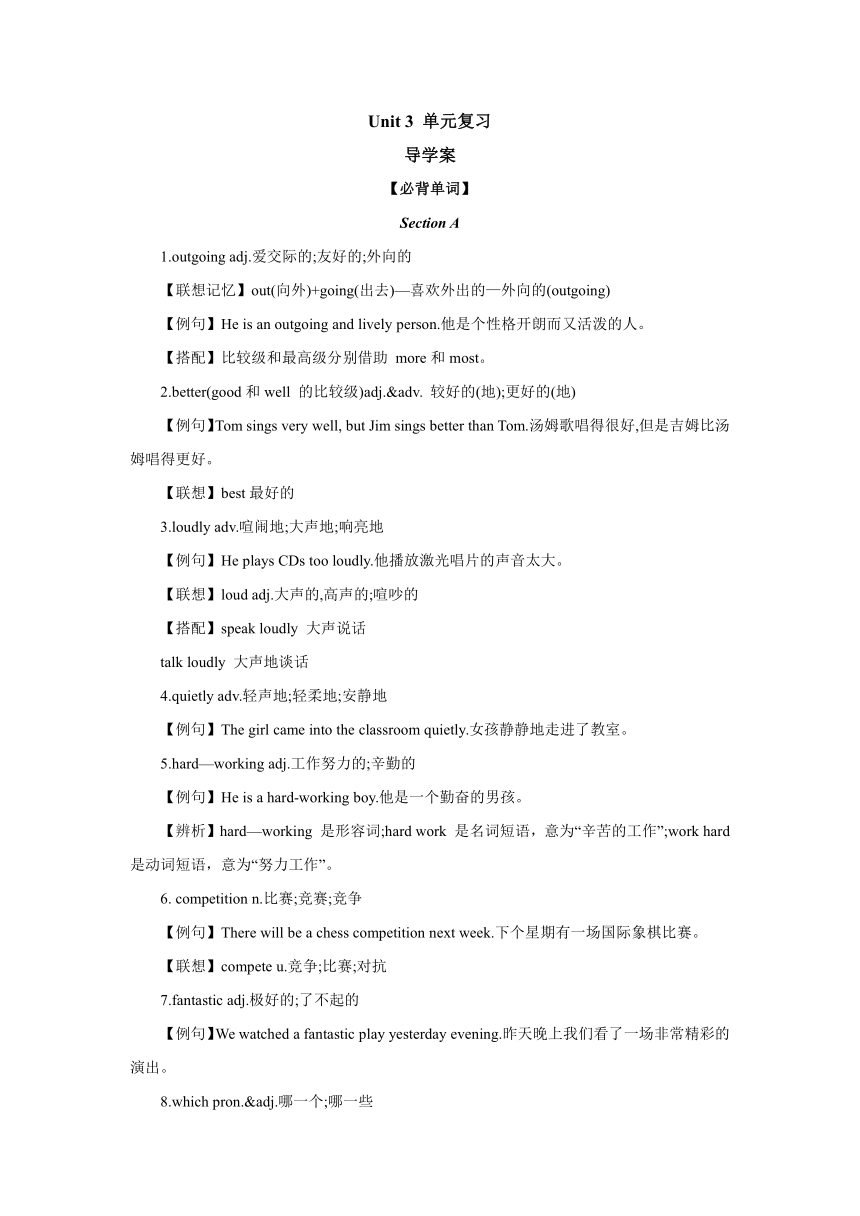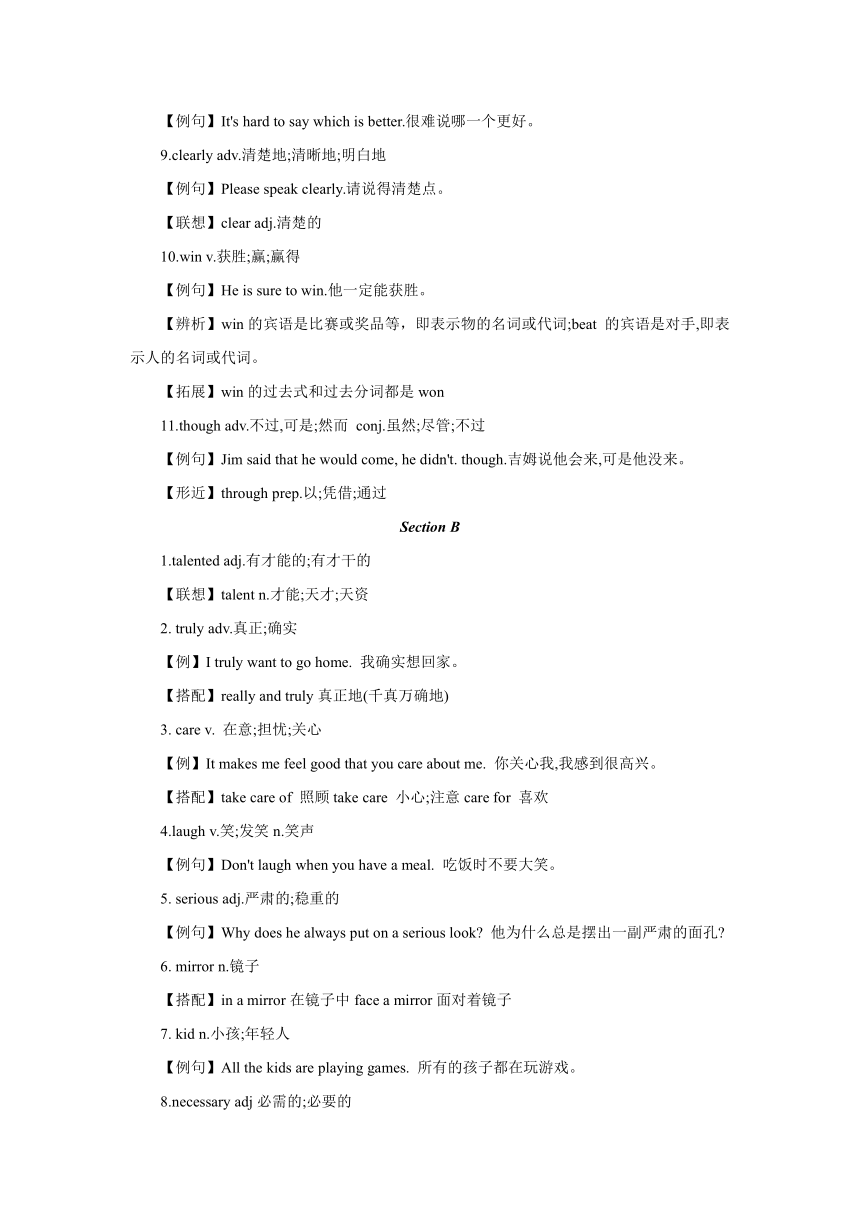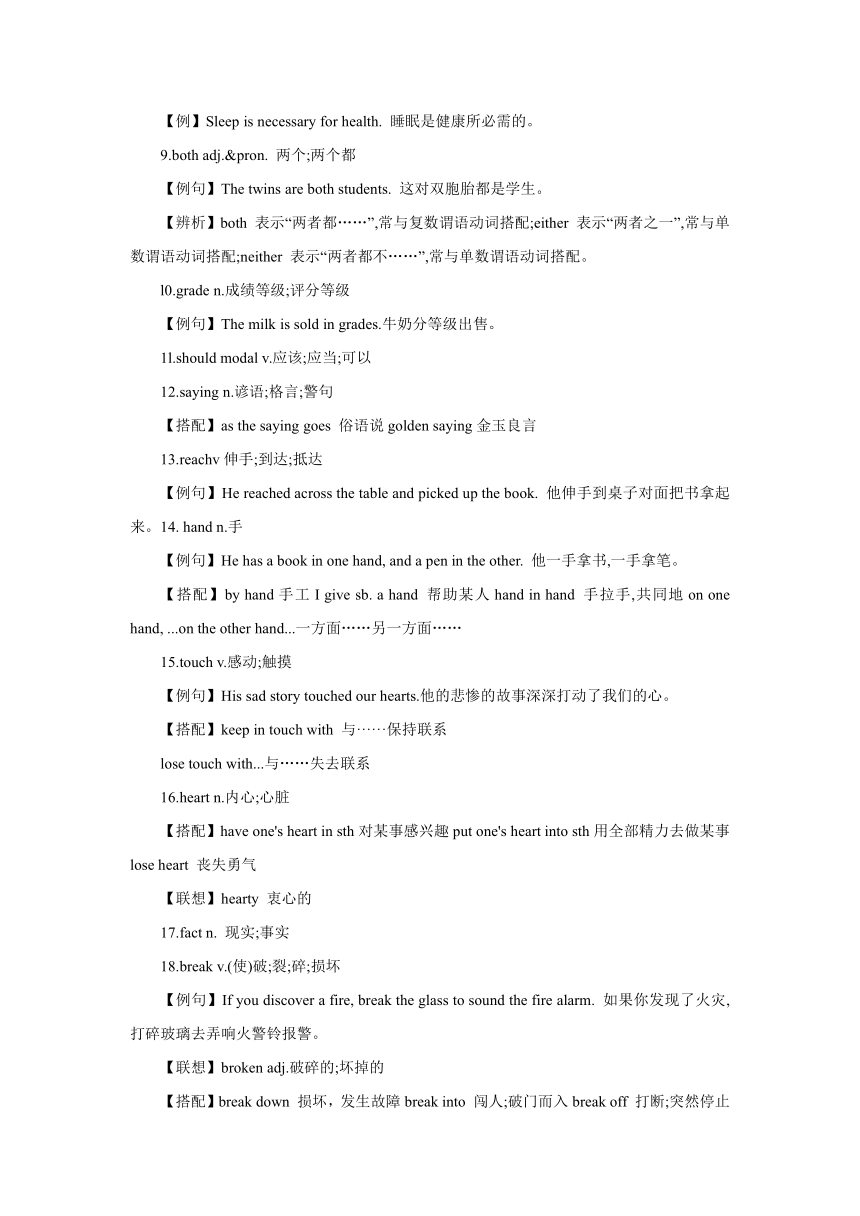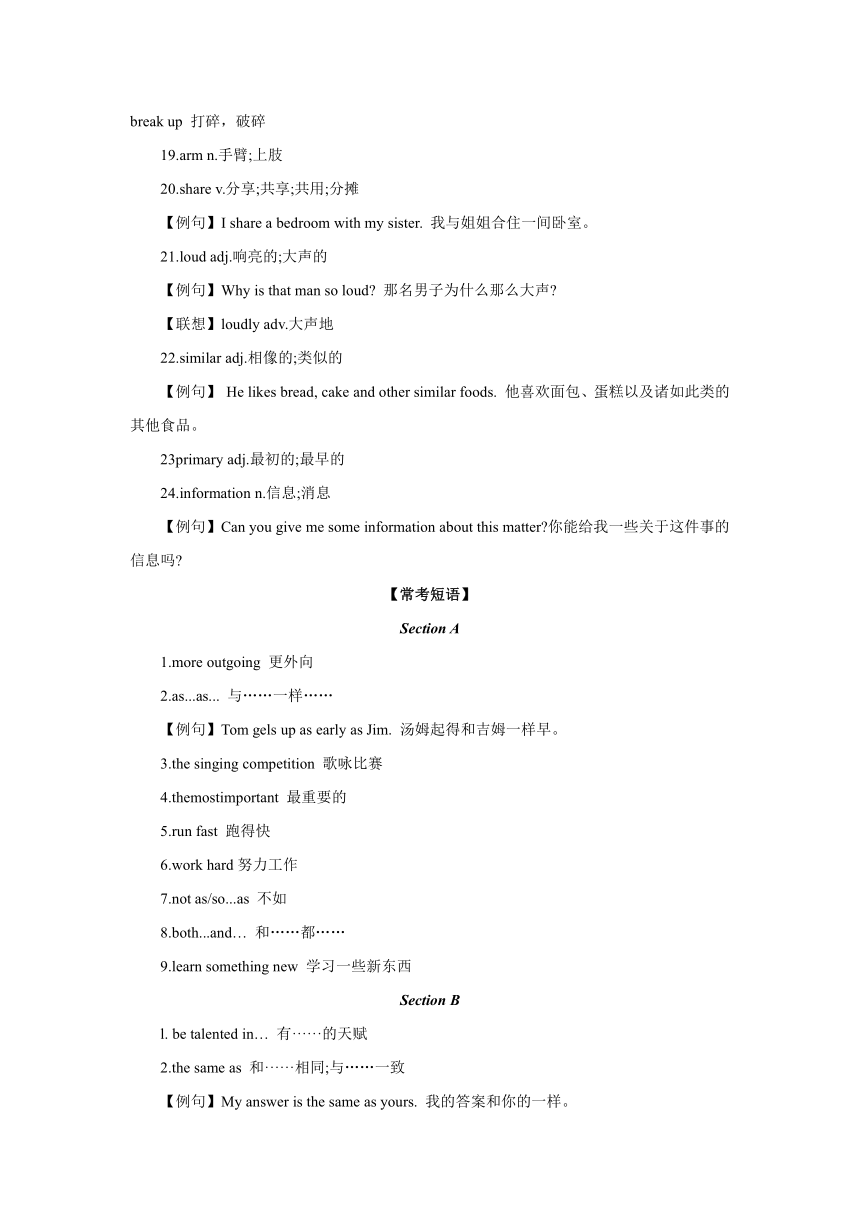人教版英语八年级上册Unit 3 I'm more outgoing than my sister. 单元复习 导学案
文档属性
| 名称 | 人教版英语八年级上册Unit 3 I'm more outgoing than my sister. 单元复习 导学案 |  | |
| 格式 | docx | ||
| 文件大小 | 23.4KB | ||
| 资源类型 | 教案 | ||
| 版本资源 | 人教新目标(Go for it)版 | ||
| 科目 | 英语 | ||
| 更新时间 | 2022-12-07 15:52:03 | ||
图片预览




文档简介
Unit 3 单元复习
导学案
【必背单词】
Section A
1.outgoing adj.爱交际的;友好的;外向的
【联想记忆】out(向外)+going(出去)—喜欢外出的—外向的(outgoing)
【例句】He is an outgoing and lively person.他是个性格开朗而又活泼的人。
【搭配】比较级和最高级分别借助 more和most。
2.better(good和well 的比较级)adj.&adv. 较好的(地);更好的(地)
【例句】Tom sings very well, but Jim sings better than Tom.汤姆歌唱得很好,但是吉姆比汤姆唱得更好。
【联想】best最好的
3.loudly adv.喧闹地;大声地;响亮地
【例句】He plays CDs too loudly.他播放激光唱片的声音太大。
【联想】loud adj.大声的,高声的;喧吵的
【搭配】speak loudly 大声说话
talk loudly 大声地谈话
4.quietly adv.轻声地;轻柔地;安静地
【例句】The girl came into the classroom quietly.女孩静静地走进了教室。
5.hard—working adj.工作努力的;辛勤的
【例句】He is a hard-working boy.他是一个勤奋的男孩。
【辨析】hard—working 是形容词;hard work 是名词短语,意为“辛苦的工作”;work hard 是动词短语,意为“努力工作”。
6. competition n.比赛;竞赛;竞争
【例句】There will be a chess competition next week.下个星期有一场国际象棋比赛。
【联想】compete u.竞争;比赛;对抗
7.fantastic adj.极好的;了不起的
【例句】We watched a fantastic play yesterday evening.昨天晚上我们看了一场非常精彩的演出。
8.which pron.&adj.哪一个;哪一些
【例句】It's hard to say which is better.很难说哪一个更好。
9.clearly adv.清楚地;清晰地;明白地
【例句】Please speak clearly.请说得清楚点。
【联想】clear adj.清楚的
10.win v.获胜;赢;赢得
【例句】He is sure to win.他一定能获胜。
【辨析】win的宾语是比赛或奖品等,即表示物的名词或代词;beat 的宾语是对手,即表示人的名词或代词。
【拓展】win的过去式和过去分词都是won
11.though adv.不过,可是;然而 conj.虽然;尽管;不过
【例句】Jim said that he would come, he didn't. though.吉姆说他会来,可是他没来。
【形近】through prep.以;凭借;通过
Section B
1.talented adj.有才能的;有才干的
【联想】talent n.才能;天才;天资
2. truly adv.真正;确实
【例】I truly want to go home. 我确实想回家。
【搭配】really and truly真正地(千真万确地)
3. care v. 在意;担忧;关心
【例】It makes me feel good that you care about me. 你关心我,我感到很高兴。
【搭配】take care of 照顾take care 小心;注意care for 喜欢
4.laugh v.笑;发笑n.笑声
【例句】Don't laugh when you have a meal. 吃饭时不要大笑。
5. serious adj.严肃的;稳重的
【例句】Why does he always put on a serious look 他为什么总是摆出一副严肃的面孔
6. mirror n.镜子
【搭配】in a mirror在镜子中face a mirror面对着镜子
7. kid n.小孩;年轻人
【例句】All the kids are playing games. 所有的孩子都在玩游戏。
8.necessary adj必需的;必要的
【例】Sleep is necessary for health. 睡眠是健康所必需的。
9.both adj.&pron. 两个;两个都
【例句】The twins are both students. 这对双胞胎都是学生。
【辨析】both 表示“两者都……”,常与复数谓语动词搭配;either 表示“两者之一”,常与单数谓语动词搭配;neither 表示“两者都不……”,常与单数谓语动词搭配。
l0.grade n.成绩等级;评分等级
【例句】The milk is sold in grades.牛奶分等级出售。
1l.should modal v.应该;应当;可以
12.saying n.谚语;格言;警句
【搭配】as the saying goes 俗语说golden saying金玉良言
13.reachv伸手;到达;抵达
【例句】He reached across the table and picked up the book. 他伸手到桌子对面把书拿起来。14. hand n.手
【例句】He has a book in one hand, and a pen in the other. 他一手拿书,一手拿笔。
【搭配】by hand手工I give sb. a hand 帮助某人hand in hand 手拉手,共同地on one hand, ...on the other hand...一方面……另一方面……
15.touch v.感动;触摸
【例句】His sad story touched our hearts.他的悲惨的故事深深打动了我们的心。
【搭配】keep in touch with 与······保持联系
lose touch with...与……失去联系
16.heart n.内心;心脏
【搭配】have one's heart in sth对某事感兴趣put one's heart into sth用全部精力去做某事lose heart 丧失勇气
【联想】hearty 衷心的
17.fact n. 现实;事实
18.break v.(使)破;裂;碎;损坏
【例句】If you discover a fire, break the glass to sound the fire alarm. 如果你发现了火灾,打碎玻璃去弄响火警铃报警。
【联想】broken adj.破碎的;坏掉的
【搭配】break down 损坏,发生故障break into 闯人;破门而入break off 打断;突然停止break up 打碎,破碎
19.arm n.手臂;上肢
20.share v.分享;共享;共用;分摊
【例句】I share a bedroom with my sister. 我与姐姐合住一间卧室。
21.loud adj.响亮的;大声的
【例句】Why is that man so loud 那名男子为什么那么大声
【联想】loudly adv.大声地
22.similar adj.相像的;类似的
【例句】 He likes bread, cake and other similar foods. 他喜欢面包、蛋糕以及诸如此类的其他食品。
23primary adj.最初的;最早的
24.information n.信息;消息
【例句】Can you give me some information about this matter 你能给我一些关于这件事的信息吗
【常考短语】
Section A
1.more outgoing 更外向
2.as...as... 与……一样……
【例句】Tom gels up as early as Jim. 汤姆起得和吉姆一样早。
3.the singing competition 歌咏比赛
4.themostimportant 最重要的
5.run fast 跑得快
6.work hard努力工作
7.not as/so...as 不如
8.both...and… 和……都……
9.learn something new 学习一些新东西
Section B
l. be talented in… 有······的天赋
2.the same as 和······相同;与……一致
【例句】My answer is the same as yours. 我的答案和你的一样。
3.care about 关心;在意
【例句】Your mother truly cares about you. 你妈妈确实关心你。
4.be different from 与······不同;与······有差异
【例句】He is quite different from his father. 他与他爸爸很不一样。
5.be like a mirror 像一面镜子
6.as long as 只要;既然
【例句】You will get good grades as long as you work hard.你只要努力学习,就会取得好成绩。
7.bring out 使显现;使表现出
【例句】I want to bring out the meaning of the poem.我想阐明一下这首诗的意义。
8.get better grades 取得更好的成绩
【例句】A healthy lifestyle helps me get better grades.健康的生活方式促使我取得更好的成绩。9.reach for one’s hand 伸手帮某人一把
10.touch one's heart 感动某人
11.in fact确切地说;事实上;实际上
【例句】In fact, I don’t know his name.事实上,我不知道他的名字。
12.make friends 交朋友
13.be good at 擅长……
14.the other 另一个
15.be similar to与······相像的、类似的
【例句】Your handwriting is very similar to his.你的笔迹和他的很类似。
16.be good with 善于应付······的
17.talk about 谈论
【例句】Let's talk about our future.咱们谈论一下我们的未来吧。
18.call...at...拨打……找……
【例句】Please call Mr. Green at 473—8989. 请打电话 473—8989 找格林先生。
19.atrue friend一个真正的朋友
20.kind of 有几分;有点
21.break ones arm 摔断了胳膊
22.share everything 分享一切
23.make sb. laugh 使某人发笑
24.be not very important for sb.对某人不太重要
【重点句型】
Section A
1. That's Tara, isn't it 那是塔拉,对吗
该句为反意疑问句。反意疑问句是指在陈述句后附加一个简短问句,用于征询肯定或否定的意见,或者希望陈述句所说的内容得到证实。反意疑问句的答语应符合事实,事实是肯定的用 yes,事实是否定的用no。当反意疑问句的构成形式为“前否后肯”时,回答yes或no与汉语习惯正好相反。这种省略回答 yes 要译成“不;不是”;no要译成“是;是的
肯定的陈述句+否定的简短问句
【例句】—Jim likes listening to music, doesn't he 吉姆喜欢听音乐,是吧
—Yes, he does.对,是的。
—Lucy is good at swimming, isn't she 露西擅长游泳,是吧
—No, she isn't. 不,不是
否定的陈述句+肯定的简短问句
【例句】—Li Lei didn't go to school yesterday, did he 李磊昨天没有去上学,是吧
—Yes, he did. 不,他去了。
—He isn't a student, is he 他不是学生,是吧
—No, he isn't. 是的,他不是
Section B
1. I'm shy so it's not easy for me to make friends. 我很腼腆,因此对我来说交朋友不是很容易。“Its+adj.+for/of sb.+to do sth."是固定句式,意为“做某事对某人来说是······的”。该句式中的 it 是形式主语,真正的主语是后面的动词不定式短语。作表语的形容词为描述事物特征的词,如 difficult, easy, hard, important, dangerous, necessary, possible 等其后的介词用 for;若此句型中的形容词为描述人物品质或性格特征的词,如 clever, foolish, kind, good, nice, silly 等,其后的介词用 of。
【例句】It's very important for us to eat a lot of vegetables every day. 每天吃大量的蔬菜对我们来说是很重要的。
It's very nice of you to lend an umbrella to me.你把雨伞借给我,真是太好了。
【语法总结】
形容词和副词的比较级
1.形容词副词的比较级的含义大多数形容词和副词有 3 个等级,分别是原级、比较级和最高级。比较级用于两者之间的人或事物的比较,意为“更……”
2.比较级构成
(1)比较级规则变化规律:
类别 变化规律 例词
单音节词和部分多音节词 直接加-er。以不发音的字母e结尾,加-r。 short-shorter, tall-taller, nice-nicer, wide-wider
以辅音字母结尾的重度闭音节,先双写这个辅音字母,再加-er。 big-bigger, thin-thinner
以“辅音字母+y”结尾,变y为i 再加-er。 heavy-heavier, early-earlier
多音节词和部分双音节词 单词前加more。 beautiful-more beautiful, outgoing-more outgoing
(2)常见的不规则变化的形容词、副词little—less many/much—more good/well—better far—farther/further
bad/badly/ill—worse old—older/elder
3. 比较的用法:
(1)“形容词/副词比较级+than”表示一方超过或低于另一方的情况。
He run three times faster than his sister. 他跑的速度比他妹妹快三倍。
(2)“比较级+and+比较级”或“more and more+原级(多音节和部分双音节词)”意为“越来越……”
The flowers arc more and more beautiful. 花儿越来越漂亮了
(3)“The+比较级,the+比较级”意为“越······就越……”
The more careful you are, the fewer mistakes you'll make. 你越认真,犯的错误就越少。
(4)“甲+be+倍数+形容词比较级+than+乙”或“甲+实义动词+倍数+副词比较级+than+乙”意为“甲······是乙······的几倍”。
This room is three times bigger than that one. 这个房间的面积是那个房间的三倍大。
(5)“甲+be+the+形容词比较级+of the two(+……)”意为“甲是两者中较……的”
Look at the two boys. My brother is the taller of the two. 看那两个男孩,我弟弟是两个当中较高的那个。
(6)疑问词+be+形容词比较级,甲 or 乙
Which is bigger, the earth or the moon 哪一个更大,地球还是月球
(7)疑问词+实义动词+副词比较级,甲or 乙
Who draws better, Jenny or Danny 谁画得比较好,珍妮还是丹尼
4.常见的修饰形容词比较级的前置词
(1)much/a lot/far十形容词比较级,意为“……得多”
He’s feeling a lot better today. 他今天感觉好多了
(2)a bit/a little+形容词比较级,意为“稍微……”
Can you come to school a little earlier tomorrow 明天你能早点儿到校吗
(3)even+形容词比较级,意为“甚至……”
This book is even more useful than that on. 这本书甚至比那本书更有用。
1 Tony is not as clever as Lucy, but he works ________than her.
A. hard B. harder C. hardest D. the hardest
2 This place is not big enough for Lucy's birthday party. We should find a ________one.
A. big B. small C. bigger D. smaller
3 Which is_______, elephant or a tiger
A. strong B. stronger C. strongest D. the strongest
导学案
【必背单词】
Section A
1.outgoing adj.爱交际的;友好的;外向的
【联想记忆】out(向外)+going(出去)—喜欢外出的—外向的(outgoing)
【例句】He is an outgoing and lively person.他是个性格开朗而又活泼的人。
【搭配】比较级和最高级分别借助 more和most。
2.better(good和well 的比较级)adj.&adv. 较好的(地);更好的(地)
【例句】Tom sings very well, but Jim sings better than Tom.汤姆歌唱得很好,但是吉姆比汤姆唱得更好。
【联想】best最好的
3.loudly adv.喧闹地;大声地;响亮地
【例句】He plays CDs too loudly.他播放激光唱片的声音太大。
【联想】loud adj.大声的,高声的;喧吵的
【搭配】speak loudly 大声说话
talk loudly 大声地谈话
4.quietly adv.轻声地;轻柔地;安静地
【例句】The girl came into the classroom quietly.女孩静静地走进了教室。
5.hard—working adj.工作努力的;辛勤的
【例句】He is a hard-working boy.他是一个勤奋的男孩。
【辨析】hard—working 是形容词;hard work 是名词短语,意为“辛苦的工作”;work hard 是动词短语,意为“努力工作”。
6. competition n.比赛;竞赛;竞争
【例句】There will be a chess competition next week.下个星期有一场国际象棋比赛。
【联想】compete u.竞争;比赛;对抗
7.fantastic adj.极好的;了不起的
【例句】We watched a fantastic play yesterday evening.昨天晚上我们看了一场非常精彩的演出。
8.which pron.&adj.哪一个;哪一些
【例句】It's hard to say which is better.很难说哪一个更好。
9.clearly adv.清楚地;清晰地;明白地
【例句】Please speak clearly.请说得清楚点。
【联想】clear adj.清楚的
10.win v.获胜;赢;赢得
【例句】He is sure to win.他一定能获胜。
【辨析】win的宾语是比赛或奖品等,即表示物的名词或代词;beat 的宾语是对手,即表示人的名词或代词。
【拓展】win的过去式和过去分词都是won
11.though adv.不过,可是;然而 conj.虽然;尽管;不过
【例句】Jim said that he would come, he didn't. though.吉姆说他会来,可是他没来。
【形近】through prep.以;凭借;通过
Section B
1.talented adj.有才能的;有才干的
【联想】talent n.才能;天才;天资
2. truly adv.真正;确实
【例】I truly want to go home. 我确实想回家。
【搭配】really and truly真正地(千真万确地)
3. care v. 在意;担忧;关心
【例】It makes me feel good that you care about me. 你关心我,我感到很高兴。
【搭配】take care of 照顾take care 小心;注意care for 喜欢
4.laugh v.笑;发笑n.笑声
【例句】Don't laugh when you have a meal. 吃饭时不要大笑。
5. serious adj.严肃的;稳重的
【例句】Why does he always put on a serious look 他为什么总是摆出一副严肃的面孔
6. mirror n.镜子
【搭配】in a mirror在镜子中face a mirror面对着镜子
7. kid n.小孩;年轻人
【例句】All the kids are playing games. 所有的孩子都在玩游戏。
8.necessary adj必需的;必要的
【例】Sleep is necessary for health. 睡眠是健康所必需的。
9.both adj.&pron. 两个;两个都
【例句】The twins are both students. 这对双胞胎都是学生。
【辨析】both 表示“两者都……”,常与复数谓语动词搭配;either 表示“两者之一”,常与单数谓语动词搭配;neither 表示“两者都不……”,常与单数谓语动词搭配。
l0.grade n.成绩等级;评分等级
【例句】The milk is sold in grades.牛奶分等级出售。
1l.should modal v.应该;应当;可以
12.saying n.谚语;格言;警句
【搭配】as the saying goes 俗语说golden saying金玉良言
13.reachv伸手;到达;抵达
【例句】He reached across the table and picked up the book. 他伸手到桌子对面把书拿起来。14. hand n.手
【例句】He has a book in one hand, and a pen in the other. 他一手拿书,一手拿笔。
【搭配】by hand手工I give sb. a hand 帮助某人hand in hand 手拉手,共同地on one hand, ...on the other hand...一方面……另一方面……
15.touch v.感动;触摸
【例句】His sad story touched our hearts.他的悲惨的故事深深打动了我们的心。
【搭配】keep in touch with 与······保持联系
lose touch with...与……失去联系
16.heart n.内心;心脏
【搭配】have one's heart in sth对某事感兴趣put one's heart into sth用全部精力去做某事lose heart 丧失勇气
【联想】hearty 衷心的
17.fact n. 现实;事实
18.break v.(使)破;裂;碎;损坏
【例句】If you discover a fire, break the glass to sound the fire alarm. 如果你发现了火灾,打碎玻璃去弄响火警铃报警。
【联想】broken adj.破碎的;坏掉的
【搭配】break down 损坏,发生故障break into 闯人;破门而入break off 打断;突然停止break up 打碎,破碎
19.arm n.手臂;上肢
20.share v.分享;共享;共用;分摊
【例句】I share a bedroom with my sister. 我与姐姐合住一间卧室。
21.loud adj.响亮的;大声的
【例句】Why is that man so loud 那名男子为什么那么大声
【联想】loudly adv.大声地
22.similar adj.相像的;类似的
【例句】 He likes bread, cake and other similar foods. 他喜欢面包、蛋糕以及诸如此类的其他食品。
23primary adj.最初的;最早的
24.information n.信息;消息
【例句】Can you give me some information about this matter 你能给我一些关于这件事的信息吗
【常考短语】
Section A
1.more outgoing 更外向
2.as...as... 与……一样……
【例句】Tom gels up as early as Jim. 汤姆起得和吉姆一样早。
3.the singing competition 歌咏比赛
4.themostimportant 最重要的
5.run fast 跑得快
6.work hard努力工作
7.not as/so...as 不如
8.both...and… 和……都……
9.learn something new 学习一些新东西
Section B
l. be talented in… 有······的天赋
2.the same as 和······相同;与……一致
【例句】My answer is the same as yours. 我的答案和你的一样。
3.care about 关心;在意
【例句】Your mother truly cares about you. 你妈妈确实关心你。
4.be different from 与······不同;与······有差异
【例句】He is quite different from his father. 他与他爸爸很不一样。
5.be like a mirror 像一面镜子
6.as long as 只要;既然
【例句】You will get good grades as long as you work hard.你只要努力学习,就会取得好成绩。
7.bring out 使显现;使表现出
【例句】I want to bring out the meaning of the poem.我想阐明一下这首诗的意义。
8.get better grades 取得更好的成绩
【例句】A healthy lifestyle helps me get better grades.健康的生活方式促使我取得更好的成绩。9.reach for one’s hand 伸手帮某人一把
10.touch one's heart 感动某人
11.in fact确切地说;事实上;实际上
【例句】In fact, I don’t know his name.事实上,我不知道他的名字。
12.make friends 交朋友
13.be good at 擅长……
14.the other 另一个
15.be similar to与······相像的、类似的
【例句】Your handwriting is very similar to his.你的笔迹和他的很类似。
16.be good with 善于应付······的
17.talk about 谈论
【例句】Let's talk about our future.咱们谈论一下我们的未来吧。
18.call...at...拨打……找……
【例句】Please call Mr. Green at 473—8989. 请打电话 473—8989 找格林先生。
19.atrue friend一个真正的朋友
20.kind of 有几分;有点
21.break ones arm 摔断了胳膊
22.share everything 分享一切
23.make sb. laugh 使某人发笑
24.be not very important for sb.对某人不太重要
【重点句型】
Section A
1. That's Tara, isn't it 那是塔拉,对吗
该句为反意疑问句。反意疑问句是指在陈述句后附加一个简短问句,用于征询肯定或否定的意见,或者希望陈述句所说的内容得到证实。反意疑问句的答语应符合事实,事实是肯定的用 yes,事实是否定的用no。当反意疑问句的构成形式为“前否后肯”时,回答yes或no与汉语习惯正好相反。这种省略回答 yes 要译成“不;不是”;no要译成“是;是的
肯定的陈述句+否定的简短问句
【例句】—Jim likes listening to music, doesn't he 吉姆喜欢听音乐,是吧
—Yes, he does.对,是的。
—Lucy is good at swimming, isn't she 露西擅长游泳,是吧
—No, she isn't. 不,不是
否定的陈述句+肯定的简短问句
【例句】—Li Lei didn't go to school yesterday, did he 李磊昨天没有去上学,是吧
—Yes, he did. 不,他去了。
—He isn't a student, is he 他不是学生,是吧
—No, he isn't. 是的,他不是
Section B
1. I'm shy so it's not easy for me to make friends. 我很腼腆,因此对我来说交朋友不是很容易。“Its+adj.+for/of sb.+to do sth."是固定句式,意为“做某事对某人来说是······的”。该句式中的 it 是形式主语,真正的主语是后面的动词不定式短语。作表语的形容词为描述事物特征的词,如 difficult, easy, hard, important, dangerous, necessary, possible 等其后的介词用 for;若此句型中的形容词为描述人物品质或性格特征的词,如 clever, foolish, kind, good, nice, silly 等,其后的介词用 of。
【例句】It's very important for us to eat a lot of vegetables every day. 每天吃大量的蔬菜对我们来说是很重要的。
It's very nice of you to lend an umbrella to me.你把雨伞借给我,真是太好了。
【语法总结】
形容词和副词的比较级
1.形容词副词的比较级的含义大多数形容词和副词有 3 个等级,分别是原级、比较级和最高级。比较级用于两者之间的人或事物的比较,意为“更……”
2.比较级构成
(1)比较级规则变化规律:
类别 变化规律 例词
单音节词和部分多音节词 直接加-er。以不发音的字母e结尾,加-r。 short-shorter, tall-taller, nice-nicer, wide-wider
以辅音字母结尾的重度闭音节,先双写这个辅音字母,再加-er。 big-bigger, thin-thinner
以“辅音字母+y”结尾,变y为i 再加-er。 heavy-heavier, early-earlier
多音节词和部分双音节词 单词前加more。 beautiful-more beautiful, outgoing-more outgoing
(2)常见的不规则变化的形容词、副词little—less many/much—more good/well—better far—farther/further
bad/badly/ill—worse old—older/elder
3. 比较的用法:
(1)“形容词/副词比较级+than”表示一方超过或低于另一方的情况。
He run three times faster than his sister. 他跑的速度比他妹妹快三倍。
(2)“比较级+and+比较级”或“more and more+原级(多音节和部分双音节词)”意为“越来越……”
The flowers arc more and more beautiful. 花儿越来越漂亮了
(3)“The+比较级,the+比较级”意为“越······就越……”
The more careful you are, the fewer mistakes you'll make. 你越认真,犯的错误就越少。
(4)“甲+be+倍数+形容词比较级+than+乙”或“甲+实义动词+倍数+副词比较级+than+乙”意为“甲······是乙······的几倍”。
This room is three times bigger than that one. 这个房间的面积是那个房间的三倍大。
(5)“甲+be+the+形容词比较级+of the two(+……)”意为“甲是两者中较……的”
Look at the two boys. My brother is the taller of the two. 看那两个男孩,我弟弟是两个当中较高的那个。
(6)疑问词+be+形容词比较级,甲 or 乙
Which is bigger, the earth or the moon 哪一个更大,地球还是月球
(7)疑问词+实义动词+副词比较级,甲or 乙
Who draws better, Jenny or Danny 谁画得比较好,珍妮还是丹尼
4.常见的修饰形容词比较级的前置词
(1)much/a lot/far十形容词比较级,意为“……得多”
He’s feeling a lot better today. 他今天感觉好多了
(2)a bit/a little+形容词比较级,意为“稍微……”
Can you come to school a little earlier tomorrow 明天你能早点儿到校吗
(3)even+形容词比较级,意为“甚至……”
This book is even more useful than that on. 这本书甚至比那本书更有用。
1 Tony is not as clever as Lucy, but he works ________than her.
A. hard B. harder C. hardest D. the hardest
2 This place is not big enough for Lucy's birthday party. We should find a ________one.
A. big B. small C. bigger D. smaller
3 Which is_______, elephant or a tiger
A. strong B. stronger C. strongest D. the strongest
同课章节目录
- Unit 1 Where did you go on vacation?
- Section A
- Section B
- Unit 2 How often do you exercise?
- Section A
- Section B
- Unit 3 I'm more outgoing than my sister.
- Section A
- Section B
- Unit 4 What's the best movie theater?
- Section A
- Section B
- Unit 5 Do you want to watch a game show?
- Section A
- Section B
- Unit 6 I'm going to study computer science.
- Section A
- Section B
- Unit 7 Will people have robots?
- Section A
- Section B
- Unit 8 How do you make a banana milk shake?
- Section A
- Section B
- Unit 9 Can you come to my party?
- Section A
- Section B
- Unit 10 If you go to the party, you'll have a grea
- Section A
- Section B
